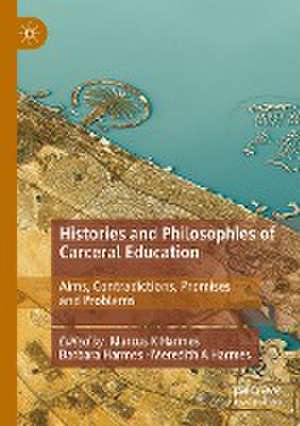Histories and Philosophies of Carceral Education: Aims, Contradictions, Promises and Problems
Editat de Marcus K Harmes, Barbara Harmes, Meredith A Harmesen Limba Engleză Paperback – 2 oct 2023
| Toate formatele și edițiile | Preț | Express |
|---|---|---|
| Paperback (1) | 639.25 lei 6-8 săpt. | |
| Springer International Publishing – 2 oct 2023 | 639.25 lei 6-8 săpt. | |
| Hardback (1) | 643.48 lei 6-8 săpt. | |
| Springer International Publishing – 29 sep 2022 | 643.48 lei 6-8 săpt. |
Preț: 639.25 lei
Preț vechi: 752.06 lei
-15% Nou
Puncte Express: 959
Preț estimativ în valută:
122.34€ • 127.25$ • 100.100£
122.34€ • 127.25$ • 100.100£
Carte tipărită la comandă
Livrare economică 15-29 aprilie
Preluare comenzi: 021 569.72.76
Specificații
ISBN-13: 9783030868321
ISBN-10: 303086832X
Ilustrații: XV, 276 p. 2 illus.
Dimensiuni: 148 x 210 mm
Greutate: 0.39 kg
Ediția:1st ed. 2022
Editura: Springer International Publishing
Colecția Palgrave Macmillan
Locul publicării:Cham, Switzerland
ISBN-10: 303086832X
Ilustrații: XV, 276 p. 2 illus.
Dimensiuni: 148 x 210 mm
Greutate: 0.39 kg
Ediția:1st ed. 2022
Editura: Springer International Publishing
Colecția Palgrave Macmillan
Locul publicării:Cham, Switzerland
Cuprins
Section one: pre-carceral education.- Chapter 1. Virgil in the Cage: Understanding Prison Consultancy, JC Oleson, Auckland University.-Section Two: restrictions and opportunities .- Chapter 2. Training the trapped or moving forward together: (In)equality, (Im)mobility and corrections education, Susan Hopkins, University of Southern Queensland.- Chapter 3. Higher education for all: Prisoners, social justice, and digital technology, Helen Farley, Department of Corrections, New Zealand and Stephen Seymour, University of Southern Queensland.- Chapter 4. Epistemic Injustice and College in Prison: How Liberal Arts Education Strengthens Epistemic Agency, Daniel McGloin, Wesleyan Center for Prison Education Academic Development.- Chapter 5. Educational Methods that Promote Autonomy in Female Inmates, Laia Moretó Alvarado, Universitat de Barcelona.- Chapter 6. The difficult art of higher education delivery in prison, Nicoletta Policek, University of Cumbria.- Chapter 7. A fast track to knowledge: Using virtual reality for learning in prisons, Jimmy McLauchlan, Methodist Mission Southern and Helen Farley, Department of Corrections, New Zealand.- Section Three: Possible Curricula: Religion, sex and the basics.- Chapter 8. Collaborative post-basic adult educational provision in Scottish prisons, Jack Dyce, Scottish College.- Chapter 9. Managing their Needs, Managing their Risks - the Education of Sex Offenders in the United States, Roger Benefiel, Bloomsburg University.- Chapter 10. The past, present and future of education programs for individuals who sexually offend, Suzanne Reich, University of Southern Queensland and Sharon Klamer, Forensic Psychology Consultants.- Chapter 11.
Notă biografică
Marcus K Harmes is Professor at the University of Southern Queensland, Australia. He has published extensively in the fields of religious and political history, with a particular emphasis on British religious history and popular culture. He is the author of numerous studies on the church in modern popular culture, especially on film and television, including book chapters in the collections Doctor Who and Race and Time and Relative Dimensions in Faith.
Barbara Harmes lectures at the University of Southern Queensland, Australia. Her doctoral research focussed on the discursive controls built around sexuality in late-nineteenth-century England. Her research interests include cultural studies and religion. She has published in areas including modern Australian politics, 1960s American television and her original field of Victorian literature.
Meredith Harmes teaches communication and also works in the enabling programs at the University of Southern Queensland in Australia. Her research interests include modern British and Australian politics and popular culture in Britain and America.
Textul de pe ultima copertă
This edited collection encourages philosophical exploration of the nature, aims, contradictions, promises and problems of the practice of education within prisons around the world. Such exploration is particularly necessary given the complex operational barriers to education, and higher education in particular, within prison-based teaching and learning. These operational barriers are matched by cultural and polemical barriers, such as the criticism of diverting resources to and spending money on prisoner education when the cost of some education seems prohibitive for people outside prison. More so than in other education contexts, prison education may fall short of higher ideals because it is shot through with both practical and moral-political problems and challenges, especially in the age of global late capitalism, high technology and mass incarceration or securitization. This book includes insights and issues around a wide range of areas including: ethics, religion, sociology,justice, identity and political and moral philosophy.
Marcus K Harmes is Professor at the University of Southern Queensland, Australia. He has published extensively in the fields of religious and political history, with a particular emphasis on British religious history and popular culture. He is the author of numerous studies on the church in modern popular culture, especially on film and television, including book chapters in the collections Doctor Who and Race and Time and Relative Dimensions in Faith.
Barbara Harmes lectures at the University of Southern Queensland, Australia. Her doctoral research focussed on the discursive controls built around sexuality in late-nineteenth-century England. Her research interests include cultural studies and religion. She has published in areas including modern Australian politics, 1960s American television and her original field of Victorian literature.
Meredith Harmes teaches communication and also works in the enabling programs at the University of Southern Queensland in Australia. Her research interests include modern British and Australian politics and popular culture in Britain and America.
Caracteristici
Explores the role of education in rehabilitating incarcerated people Examines the nature, aims, contradictions, promises and problems of the practice of education in prison Analyses what more needs to be done at the intersection of incarceration and education
